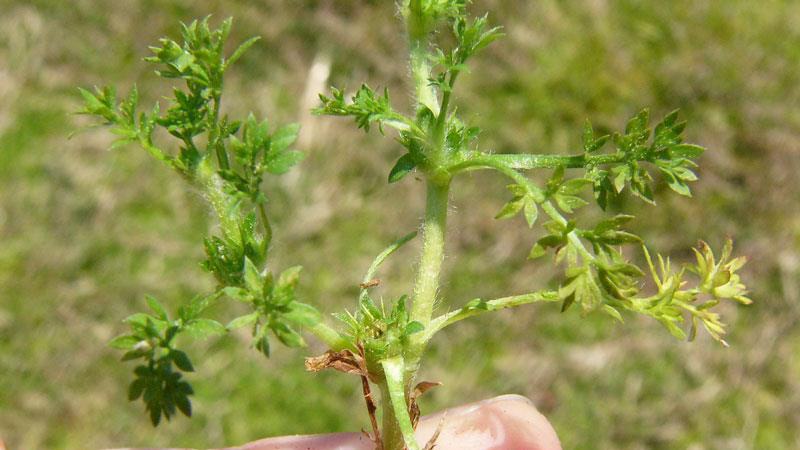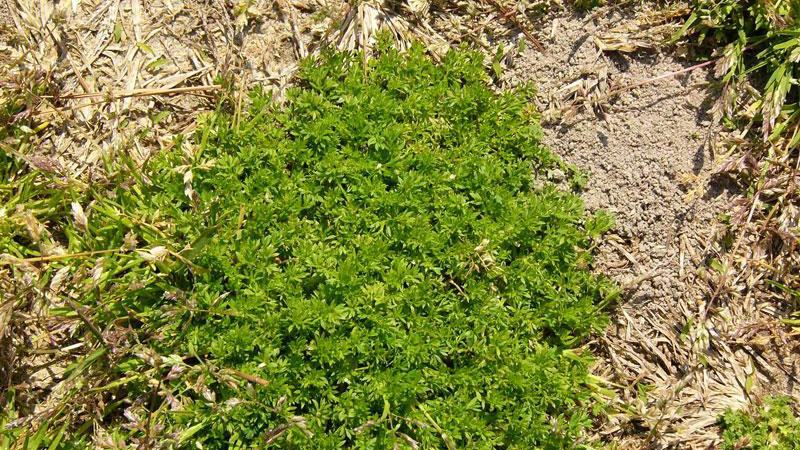Summer is over, and the fall is finally here. With that, our lawns are growing slower and we’re able to spend less time on the mower. But just because the cool weather is around the corner and our grasses are going dormant doesn’t mean we should stop caring for our lawns. In fact, if you’ve had issues with lawn burrweed, also called spurweed, now is the time to act!
Burrweed is a low-growing winter annual weed. It starts germinating when nighttime temperatures get into the 50’s and will slowly take over our fall and winter lawns. However, most people don’t notice the weed until the spring when it produces its namesake spiny seeds. At that point, the infestation has likely grown out of hand, and control is nearly impossible. So how do you control this prickly beast?
The first and most passive recommendation is to maintain a lush, thick lawn. Doing so will help reduce weed populations by competing for light and nutrients. If you have a fescue lawn, that means overseeding in the fall, and irrigating in the warmer months to maintain a full stand. Check out the Carolina Lawns publication for more maintenance recommendations for a fescue lawn.
In Currituck, we recommend planting warm-season grasses such as Bermuda, St. Augustine, or zoysia grass instead of cool-season grasses like fescue. They're more tolerant to our summer heat, but go dormant in the winter. Passive control for warm-season grasses is similar, following the Carolina Lawns maintenance recommendations when possible. The only exception is Bermuda. One possible control option for homeowners with Bermuda lawns, particularly if you have bad burrweed infestations, is to overseed with rye in the fall. Rye grass is allelopathic, meaning it produces a compound that reduces plant growth. That’s beneficial in reducing nearby weeds, but can damage and slow our lawn growth as well. For bad burrweed infestations in Bermuda lawns, I recommend trying to overseed with rye in the fall, and then overseeding again with Bermuda in the late spring.
The next control option is relevant for this time of year, and is aimed to reduce the burrweed population before it gets started: pre-emergents. Pre-emergent herbicides work to reduce seed germination. That means if you’ve had burrweed in the past, the herbicide will reduce how many successfully establish this year. Broadleaf weed pre-emergents will prevent broadleaf weeds from germinating while allowing grass seeds, such as fescue or rye, to emerge. These can be purchased at most of the big hardware stores, and are usually sold as a granular that can be spread with a broadcast spreader. Our NC State Extension Burrweed publication has other pre-emergent options, but they may be difficult to find in stores. The two listed products are Tenacity and Echelon. Both are labelled for use in fescue and some warm season grasses, although they aren’t listed for Bermuda. Be sure to read the herbicide label before purchasing to make sure you are comfortable applying, and that the product is labelled for your type of lawn. Labels are found on all pesticides, usually as a booklet on the back, and contain all necessary information on safety and handling. For additional label questions, contact Adam Formella at the N.C. Cooperative Extension of Currituck County office (information below).
The last control option is post-emergent herbicides. These products work once the plants have germinated. You may be able to find post-emergent broadleaf herbicides at the stores that provide adequate control; however, I recommend trying a product from the NC State Extension Burrweed publication first. Two products labelled for home use are Surge and TZone SE. Both of these products can be used in fescue and Bermuda lawns, but are not labelled for all warm season grasses. Be careful with these products in warm-season grass lawns as they may damage grasses that aren’t dormant.
Ultimately, lawn burrweed is a bothersome weed that requires a three-pronged approach to control. Proper lawn maintenance is key to reduce areas where the weed can grow. Pre-emergent herbicides applied in the fall will reduce the seed bank in our lawns by reducing germination. Finally, spot treatment with post-emergents before the weeds produce seeds will eliminate plants before they have the opportunity to spread. Following these recommendations, over a few years, should help reduce and rid your lawn of the dreaded lawn burrweed.
For questions on lawn burweed control, or other lawn maintenance topics, contact Adam Formella, Currituck County Agriculture Extension Agent at adam_formella@ncue.edu or by phone at (252) 232-2261.

